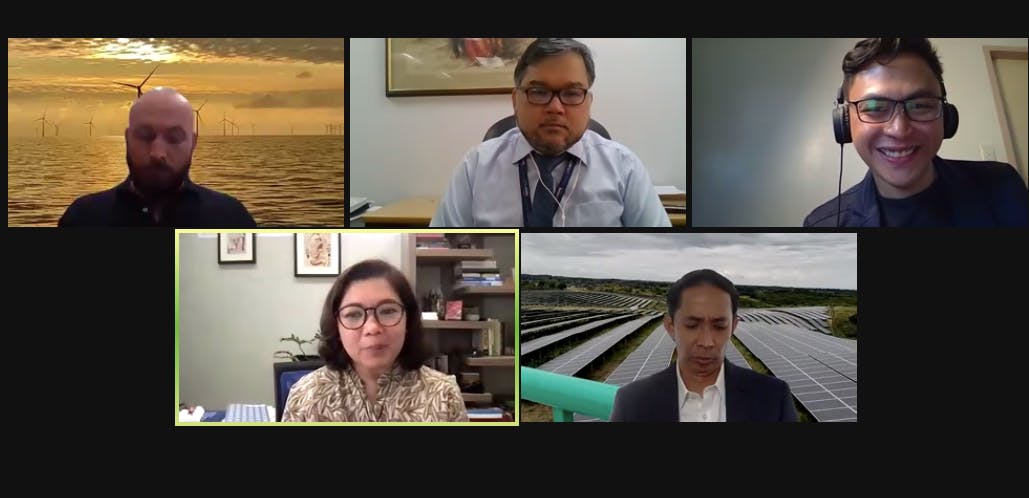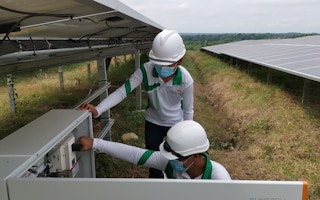Independent clean energy companies in the Philippines are an underexploited and underfunded source of power generation, indicated by recent statistics released by the country’s energy department.
To continue reading, subscribe to Eco‑Business.
There's something for everyone. We offer a range of subscription plans.
- Access our stories and receive our Insights Weekly newsletter with the free EB Member plan.
- Unlock unlimited access to our content and archive with EB Circle.
- Publish your content with EB Premium.
The department listed private sector initiated power projects in the country as of December 2019, including 897 megawatts (MW) of approved renewable energy projects. But there are still 31,802MW of pending installations in various stages of pre-development, waiting to be financed. The Southeast Asian nation aims to reach a 35 per cent renewable energy target by 2030.
Among private sector-led independent clean power producers, smaller firms face the most difficulty in securing financing, unlike larger and more established conglomerates which can access loans more easily due to their higher credit rating and proven track record.
Industry experts discussed how homegrown green energy projects can overcome barriers to accessing finance during an online roundtable on 19 March entitled: The 35% RE blueprint to 2030: Assessing opportunities for financing RE ambition in the Philippines, organised by sustainable finance platform Greening the Banks Initiative.
“
We dream of the day that banks will be open to 100 per cent merchant projects.
Aboy Castro, founder, Cleantech Global Renewables
“It matters that small renewable energy companies like ours are given financing. We are closer to the ground, so we can start projects at a faster pace than the larger corporations,” said Aboy Castro, founder of independent power producer, Cleantech Global Renewables.
“We also provide competition [to larger companies] which is very important because it gives options to consumers, hence lowering electricity costs for end-users.”

Panelists at the virtual forum included (clockwise from left) Marsh’s Martin Beck, United Coconut Planters Bank’s Michael Zapata, Greening the Banks’ Marlon Apanada, Cleantech’s Aboy Castro and National Renewable Energy Board’s Monalisa Dimalanta.
Cleantech’s 22MW solar installation in San Ildefonso, Bulacan struggled to attract funding, according to Castro as it is considered a “merchant plant” —a project with no power supply agreement which enables electricity to be sold to the local distribution utility. Typically, agreements with direct buyers called “offtakers” are required by banks as a guarantee that the electricity generated would be purchased.
Instead, the five-year old firm sells the power directly through the Wholesale Electricity Spot Market, the country’s trading floor of electricity, where dispatching energy generation is dependent on which power company makes the lowest bid.
“[A project with no power supply agreement] is exactly a project that local lenders do not want to finance because they feel that there is a market volatility risk,” Castro told the panel.
“There are banks that will only accept projects with a power supply agreement but there are some banks open to funding projects with a portion that is uncontracted as long as the cash flows are predictable. We dream of the day that banks will be open to 100 per cent merchant projects.”
“
If there are no offtakers at all, we can still finance the project but it has to have steady cash flow… There will be a lot of discussion but we are open to finding the right funding structure for each project.
Michael Zapata, team head of investment banking division, United Coconut Planters Bank
A clean energy auction organised by the department of energy’s National Renewable Energy Board (NREB) in June, is hoped to fulfil banks’ stringent requirements for contractual agreements.
The Green Energy Auction programme is a competitive process for the procurement of renewable energy supply for an initial capacity of 2GW.
“In the auction, we are planning to form a group of banks that can readily finance projects which will be awarded under the programme,” said Monalisa Dimalanta, chairperson of the board which develops the policy framework to help the country achieve the goals set under the Renewable Energy Act of 2008.
“By sheer volume alone of individual projects, smaller ones might be edged out by the larger scale projects, but if we put together all those capacities then we can have a centralised procurement for green energy projects.”
Michael Zapata, team head of United Coconut Planters Bank’s (UCPB) investment banking division, told the panel that financial institutions would be open to NREB’s proposed scheme if only to give more access to financing for small developers.
Lenders are very much interested in financing small independent renewable power projects but there is no “one-size-fits-all” basis for loan approvals, according to Zapata.
“Different buyers have different credits. If there are no offtakers at all, we can still finance the project but it has to have steady cash flow. If not, then the project’s sponsor has to be credit-worthy enough so we can just loan directly to the sponsor. There will be a lot of discussion but we are open to finding the right funding structure for each project,” Zapata said.
Accessing finance as a smaller firm
To complete the funding of its solar installation, Cleantech used a type of security called hybrid insurance which allowed for the coverage of its entire loan.
Castro said that it was arranged by the European financier of their project because the lender already had a long-standing business relationship with the insurance provider.
The firm had to pay a premium for it, but with an interest rate higher than what it would get from a bank. But Castro noted that because the project is not stalled by the sluggish loan process with local banks, their transaction comes with less opportunity losses.
“The lender was very comfortable with that type of insurance because they’ve already done that before. There was that system in place which made it very easy for us to process that loan,” said Castro, who is also the chief technology officer of Cleantech.
Castro said his company is also working with a multi-lateral lender to help issue its first green bond that will raise funding for planned solar and wind projects.
Cleantech is also using a credit wrap which enables it to use the credit rating of the lender instead of its own when it seeks loan approval.
UCPB’s Zapata agreed that hybrid insurance and credit wraps were creative ways for small companies to secure their own financing, but said that the government could follow Argentina’s creation of a national trust for renewable energy projects if it really wanted to boost the green power mix.
In the early 2000s, Argentina’s goal was to generate 20 per cent renewables by constructing 10,000MW by 2025, with the offtaker being the country’s national utility company.
FODER, a national trust for renewable energy projects, was created by the Argentine government to provide loans and interest rate subsidies to the independent power producers.
“It would be beneficial to have a FODER model in the Philippines so that all offtakers will be the most credit-worthy ones. We don’t have that yet but if there will be one then it would deifnitely help in financing these small projects,” he said.

















